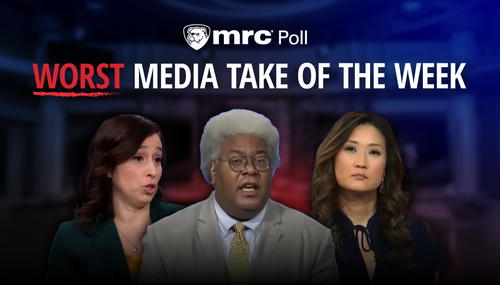The feverish conspiracy theories (will Trump cancel the November elections? Will he refuse to accept defeat?) have spread from late-night “comedians” to the august pages of the New York Times.
In the lead article in Monday's National section, reporter Reid Epstein began his story -- “How Far Would Trump Go to Keep Job? Foes Brainstorm Options – Anxiety Levels Increase As the President Attacks The Integrity of the Vote." Epstein wasn't dealing in facts as much as Resistance "doomsday scenarios."
In October, President Trump declares a state of emergency in major cities in battleground states, like Milwaukee and Detroit, banning polling places from opening.
A week before the election, Attorney General William P. Barr announces a criminal investigation into the Democratic presidential nominee, Joseph R. Biden Jr.
After Mr. Biden wins a narrow Electoral College victory, Mr. Trump refuses to accept the results, won’t leave the White House and declines to allow the Biden transition team customary access to agencies before the Jan. 20 inauguration.
Far-fetched conspiracy theories? Not to a group of worst-case scenario planners – mostly Democrats, but some anti-Trump Republicans as well – who have been gaming out various doomsday options for the 2020 presidential election. Outraged by Mr. Trump and fearful that he might try to disrupt the campaign before, during and after Election Day, they are engaged in a process that began in the realm of science fiction but has nudged closer to reality as Mr. Trump and his administration abandon longstanding political norms.
Democrats have been trying to discredit the 2016 results from Day One, demanding recounts in three states, trying to get Electoral College members to change their votes, making bizarre feints toward packing the Supreme Court, and finally the Russia-collusion hoax. But it's Trump who wants to “abandon longstanding political norms."
The anxiety has intensified in recent weeks as the president continues to attack the integrity of mail voting and insinuate that the election system is rigged, while his Republican allies ramp up efforts to control who can vote and how. Just last week, Mr. Trump threatened to withhold funding from states that defy his wishes on expanding mail voting, while also amplifying unfounded claims of voter fraud in battleground states.
“In the eight to 10 months I’ve been yapping at people about this stuff, the reactions have gone from, ‘Don’t be silly, that won’t happen,’ to an increasing sense of, ‘You know, that could happen,’” said Rosa Brooks, a Georgetown University law professor. Earlier this year, Ms. Brooks convened an informal group of Democrats and never-Trump Republicans to brainstorm about ways the Trump administration could disrupt the election and to think about ways to prevent it.
The only jolt of balance came midway through.
“Hillary Clinton, Stacey Abrams and the entire Democratic Party refused to accept the results of their elections and pushed the Russia collusion conspiracy theory for years,” said Tim Murtaugh, the communications director for Mr. Trump’s re-election campaign. “Now Joe Biden’s allies have formed actual conspiracy committees where they’ll work up new hoaxes to further undermine our democracy. They are wasting their time. As President Trump has repeatedly said, the election will happen on Nov. 3.”




